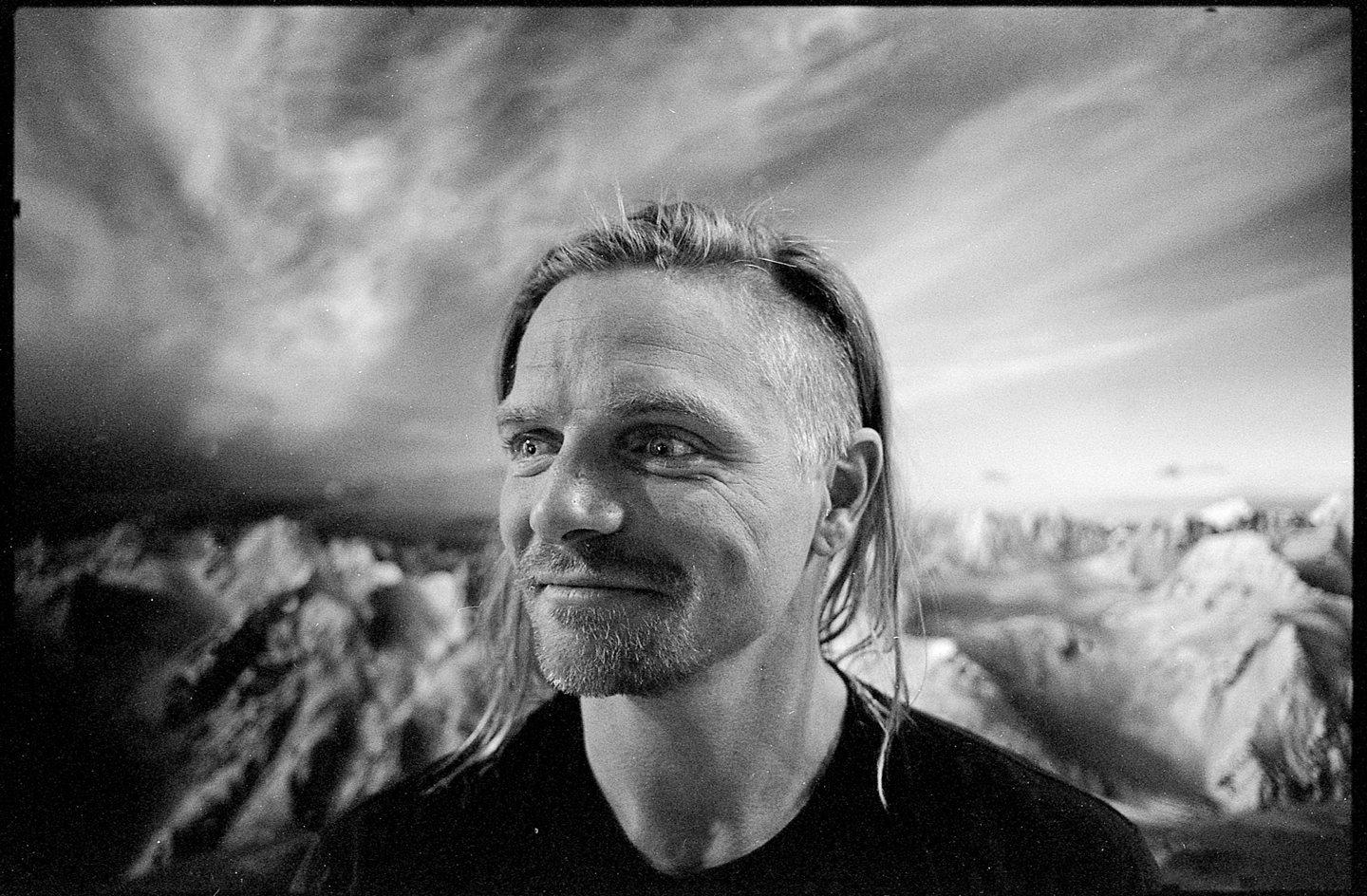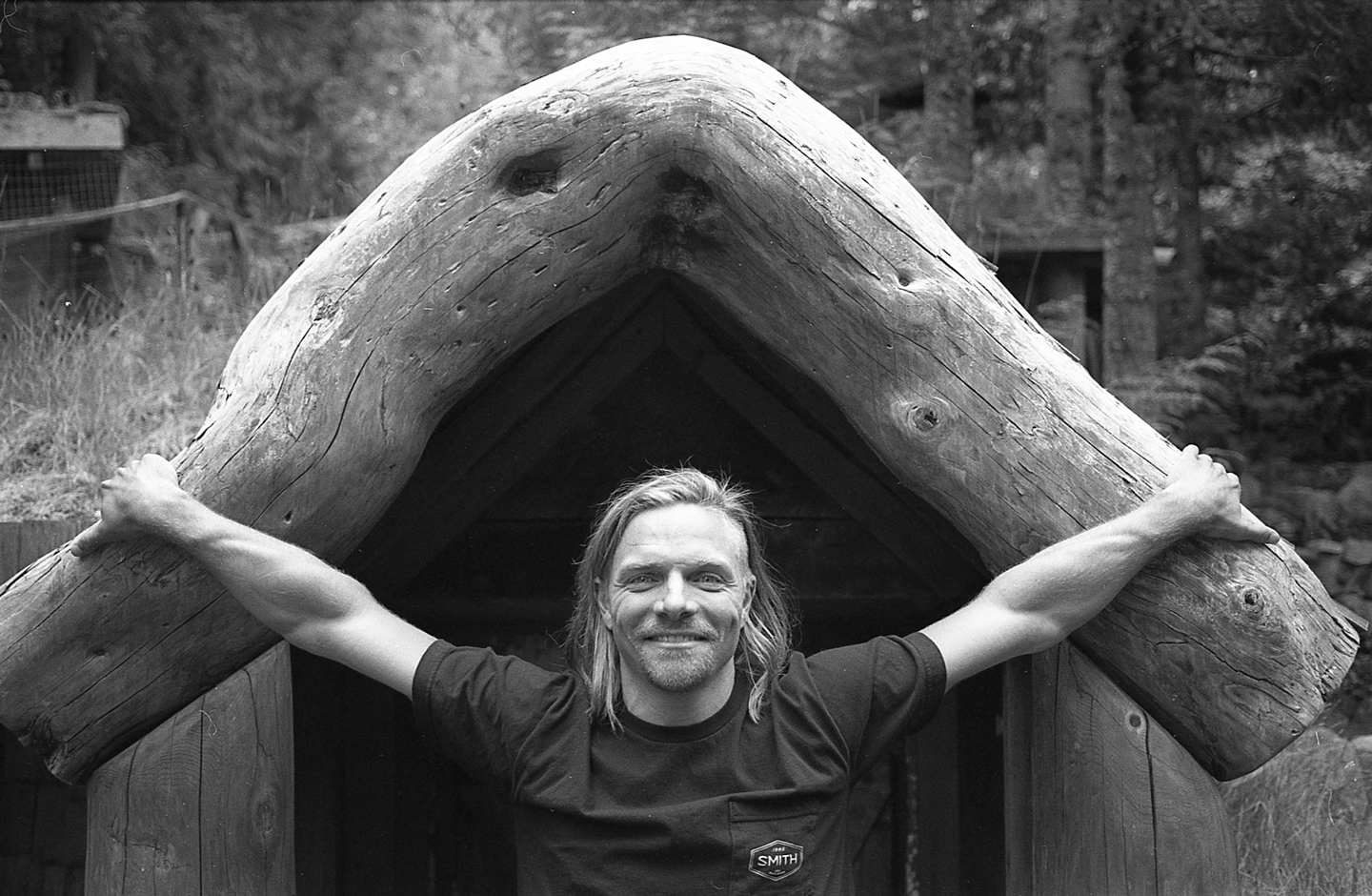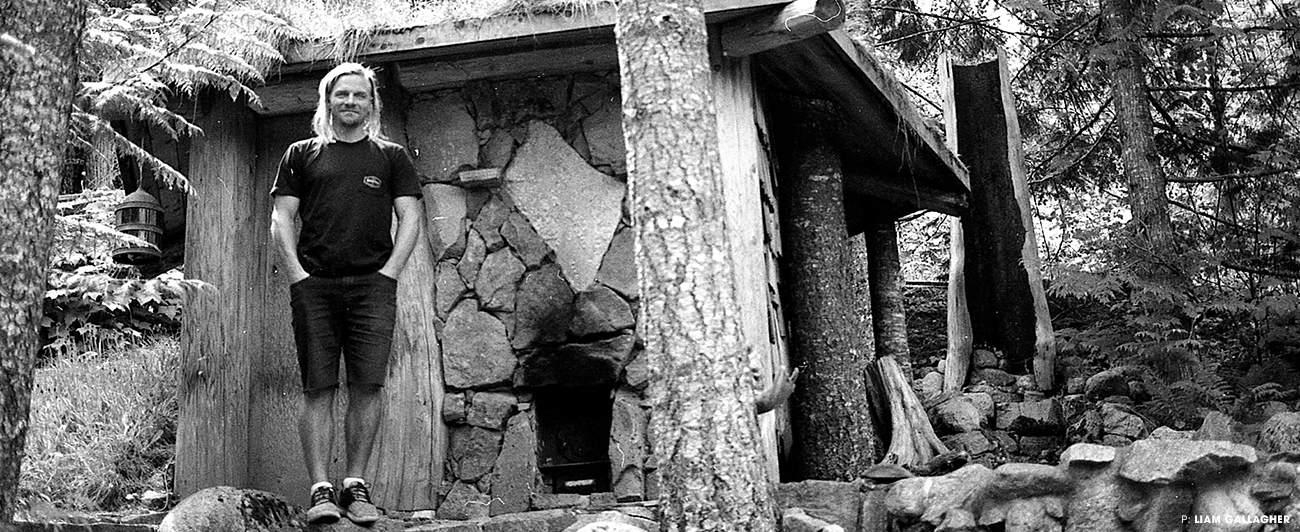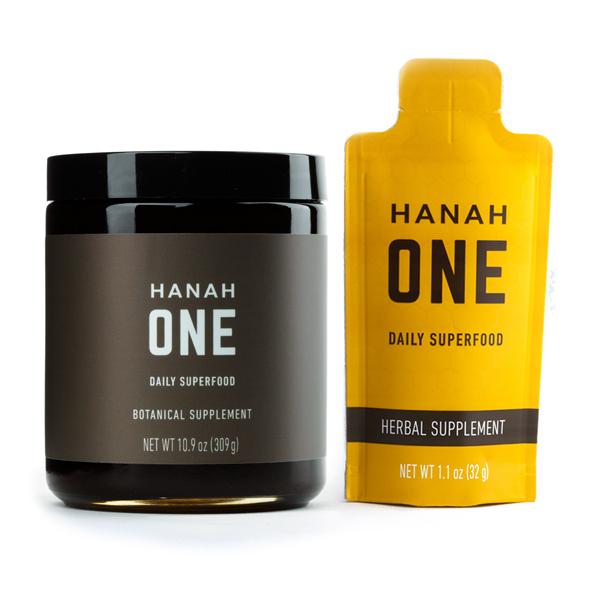Contest & Interview
Mark Abma
Enter Contest Below
Hanah Life – 3 month supply giveaway
HANAH’s mission is to preserve ancient traditions and adapt them into remedies for modern living.
Prize includes – retail value $260
- 3 HANAH ONE jars
- 1 box Go-Packs
- 1 jar Ashwagandha
*Extra Entry – Share and like the Facebook post*
*2x Extra Entry – Share, Tag 2 friends and like the Facebook post*
POC Contest
Factor in the Good Times:
Finding the Balance with Mark Abma
Words: Sakeus Bankson, Photos: Liam Gallagher
There very well could be elves living in Mark Abma’s backyard. Or maybe hobbits. Cold, clear water spills from under a miniature wooden cottage, falling through a series of stone pools nestled on the hillside, before passing under a strange metal contraption wrapped in copper piping. It’s all beautifully constructed, lending an air of mystery to the intriguing structures.
Overall, it feels as if it could be pulled from the Shire or some fairy tale, but in truth, the entire setup is essentially a hand-made health spa. On any summer morning, you’ll find Abma neck-deep in the frigid pools for his daily hydrotherapy sessions, and the tiny building—seemingly carved from a stump with a mossy, wood-shingle roof—is a sauna, which he uses year-round. And as for the copper and metal creation? It’s is the heating mechanism for his wood-fired hot tub.
This isn’t strange for Abma—his entire routine is built around intentional healthy living, including his home in Pemberton, BC. Beyond the backyard hydrotherapy, there’s his extensive raised-bed garden. There’s the room dedicated specifically to yoga, stretching and meditation, or the mini-gym setup in the window-walled room below his deck, including a full weight set and stationary bike. The kitchen is near professional grade, as Abma himself is a talented cook—he was even part-owner of a local farm-to-table restaurant for a short stint. All added up, Abma is possibly the healthiest man in freeskiing.
It hasn’t always been that way, especially when it comes to nutrition—Abma calls that awareness a “slow evolution,” beginning when he was in his mid-20s. But after 15-plus years as a professional skier, through multiple serious injuries, the HANAH ONE athlete remains one of the best in the world. And he has no intention of slowing down.
“A lot of our days start at 4:30 a.m., and we often don’t get home until 9:30 or 10 p.m.” Abma says. “Eating well allows me to put in those super long days, and gives greater clarity of mind, which means greater creativity and greater focus. Those are both keen for what we’re doing—trying to find a new and unique ways to ski.”
And the 38-year-old Canadian continues to do just that. We recently asked Abma about the perfect breakfast, overcoming injuries, and health advice for the rest of us.

ABOVE Home sweet home. Abma poses in front of a giant image of Alaska, taken during a trip to the state years before. The photo now hangs inside his house near the front door, a reminder of the wild world outside.
The Ski Journal: What does a morning for Mark Abma usually look like?
Mark Abma: Well, I always start off with a glass of water mixed with apple cider vinegar and a turmeric-ginger concentrate mix. I’ve recently become a Bullet Coffee guy, and knowing that coffee is acidic, I use the apple cider vinegar—which is alkaline—to balance that out. Then turmeric and ginger are highly anti-inflammatory, which is obviously good for muscle recovery but also great for your brain.
Your brain needs fats, and so does your body—if you start bonking throughout the day, there’s a good chance it’s because you’re operating on sugar for energy. What sold me on the Bullet Coffee concept is how great a delivery system it is for getting that fat to your brain, through MCT oil and grass-fed butter. If you’re operating on fats, then as soon as you burn through your morning meal, you start using fats in the rest of your body—and we always have extra fat. It allows you to keep and sustain energy throughout the day.
To make the coffee more like a meal, I add Ashwagandha (an herb with properties purported to reduce inflammation and increase thinking ability), a blend of 14 mushrooms, and HANAH ONE. It’s definitely very complicated, but I’ve got a system now—basically, it’s just five pre-mixed ingredients in a blender. That typically keeps me going until noon, and then I’ll have lunch.
What about when you’re traveling? Do you try to stick to that routine?
As soon as you start traveling, it becomes more difficult. I can’t control all the foods I’m eating on the road, and when I’m in another country I want to try the different foods—that’s a big part of the experience for me. That’s where HANAH ONE has been a benefit, because it helps create a baseline for me.
I’m probably going to become stricter with my diet as I get older, but I still enjoy going out and partying and having some drinks and whatnot, especially when I’m traveling. That’s something I go back and forth with? Because it’s like partying is a big part of the experience, but at the same time, it’s like I don’t know, I feel like once I reached that state of high energy I want to maintain that for as long as possible. You know?
Mainly, I don’t think it’s good to be too serious about life. I think it’s important to just be conscious of your decisions. I’m going to eat well 90-percent of the time, but if I’m eating shitty the other 10 percent that’s okay. If you’re aware of it, you can balance it out with goodness throughout the rest of your life. You’ve got to factor in the good times, too.

ABOVE Enter here for relaxation. Abma built his sauna from scratch, using salvaged wood and stone and topping the structure with a grass roof.
So what’s the key to longevity, from a guy who’s been at the top for 15-plus years?
I think it’s staying hydrated, staying flexible and keeping your mind and body active. If we do that, I think we can live much longer and healthier than previous generations. I look at how when we’re born, our bodies are filled with water and super supple and flexible. A two-year-old can put their foot behind their head, but at 50 or 60 it can be hard to put shoes on. So that’s an easy one—just drink more water, and I think your body will be able to heal a lot easier.
When I have time to do my yoga routine, I make sure to incorporate a meditation process as well. We have so much going through our minds these days—finances, jobs, relationships, all the digital stimulation from our phones—that our minds are spinning all the time. I think it’s becoming ever more important to silence your mind for a bit. For me, I think it’s through that silence I have more creative thoughts.
You had a scare with a knee injury early this season. It turned out to be relatively minor, but what was going through your mind before you found that out?
Well, you never really know what the outcome of an injury is going to be, so basically, I just surrendered to whatever happened. It was quite remarkable how quickly my body healed up—I was back on snow three weeks later, with no pain. And it’s not affecting my psyche when I’m in the mountains anymore. It was an interesting process, just having to let go, but I found it very liberating.
At the same time, I think that’s a lesson skiing can teach us well: to be humble. Some days, conditions aren’t going to permit you to do what you want, and you’re going to have to adapt. Skiing has taught me how to deal with adversity, with plan changes or general changes in life. When I hurt my knee, I decided if it meant I had to move away from skiing and do something else, then so be it.
Is there anything you’d like to improve?
I’m trying to work towards having more consistency in my diet. I can definitely slack on stretching too—to be honest, some weeks I’m just too busy, and if I’m getting a 4:30 a.m. start I won’t have the extra time in the morning. But I’ll often just literally do a quick stretch when I get up into the mountains, before we start skiing. Or I’ll do it when I get back home that night.
In general, I just want to continue taking care of my body, because as I’m getting older things are getting tighter. I’m still pushing myself as hard as when I was young, and I feel if I can stay loose and limber I’ll be able to prevent injuries that much more throughout the rest of my career. Ultimately, I want to be skiing into my 90s, and still enjoy it.
What about for the rest of us? Any advice?
Just don’t take your body for granted. When we’re young, our bodies are pretty resilient and can take a lot of abuse, but in reality, we’re putting them through way more than they’re designed for. So start a training program, and build the strength to withstand impact. Begin a stretching program, so you can stay flexible and keep taking those hits as long as possible. Drink more water. And once you find what works for you, if you start feeling like you have more energy, I think it’s good to listen to that. You’re doing something right.
But most importantly, just keep having fun on skis. Don’t take it too seriously. As long as you’re having fun, you’re going to continue to progress and have passion and energy for the sport. That’s critical—for becoming a better skier, and a better person.
Rules and Regulations
-
Presented by The Ski Journal, PO Box 2806, Bellingham, WA, 98226.
-
Entry includes the email in The Ski Journal and Hanah Life Email Newsletter Database
-
Odds are determined by the number of entries.
-
Prize includes – retail value $260
- 3 HANAH ONE jars
-
1 box Go-Packs
-
1 jar Ashwagandha+
-
One entry per person.
-
No purchase necessary.
-
Winner will be selected December 20, 2018.

